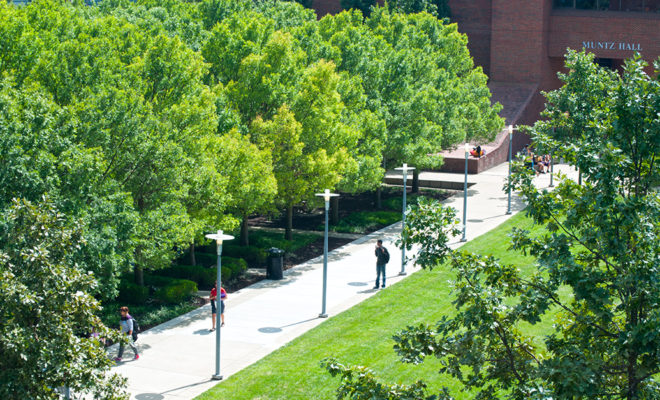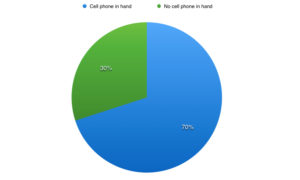By Luisa Colapietro, Austin Holt, Chris Laycock, and Sam Lin
How often do you hold the door for the next person on campus? This may seem a pointless question, but it’s actually quite important. Holding doors shows manners and consideration, which, after observing certain doors around campus, we noticed UCBA is lacking. When we researched the door near the auditorium in Muntz Hall, we found that only 76.3% of people held it open for the person behind them. Out of that 76.3%, only 7.9% held it for someone who was over five feet away. That shows that we aren’t aware of our surroundings. So, we wanted to get to the root of this lack of manners.
First, we asked ourselves, “Looking around campus, what do we see? What is everyone doing? Are they studying or chatting?” We found that, most of the time, they were on their phones. While making outdoor observations, we noticed that students often nearly walk into the school’s gator (a heavy-duty golf cart used to maintain campus grounds driven by one of our writers). We also observed students tripping over elevated sidewalks and walking into one another, trees, and poles.
That’s due to the constant immersion students have in technology. Rather than looking up at what’s going on in front of them, they ‘re looking into their phones. Their focus is impressive, considering the amount of noise the gator makes when it is being driven.
So, after noticing this cell-phone phenomenon, we decided to observe phone use specifically. To do so, we watched the common areas for students in the Muntz and Walters Hall lobbies. The people there occupied the time in a litany of ways. Some did homework, read textbooks or used their devices. Some listened to music, others messaged friends or watched videos. We also noticed that a small percentage of people were having a round-table discussion about academic topics, and it was an exceptional sight to even see people engaged in face-to-face conversation. It was especially rare to not see a phone between them.
In another observation, we waited outside a classroom to see how many students would be on their phones on the way out. According to Figure 1, nearly 50 students observed, approximately 35 had a phone in hand (nearly 70%).
Thus, we concluded that students are not aware of their environment because they’re immersed in their devices. We then decided that this technological addiction leads to poor manners and fewer interpersonal interactions, which means fewer people befriending one another. And when you put that all together, you get a divided community. It’s not surprising that most of us would rather text a good friend than try to make a new one in person.
But we can’t let ourselves forget the importance of friendship, even in today’s technology-driven world. Friendships uplift us and make us happy. Not to mention that we can make connections through friends that can help our grades, careers, etc. So, instead of whipping your phone out in the Walters or in class, try sparking up a conversation with a stranger. You can only benefit from it, so why not give friendship a try?





